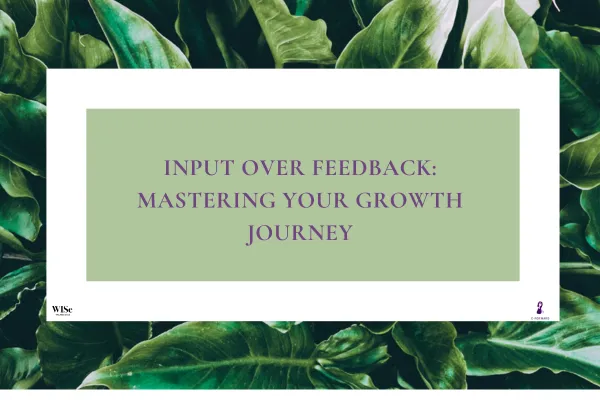
Input Over Feedback: Mastering Your Growth Journey

In the landscape of personal and professional development, the conventional wisdom of "feedback as a gift" often falls short. Instead of seeking feedback, it's far more empowering to ask for "input." This crucial distinction allows you to maintain control over your growth, ensuring that external perspectives serve your self-improvement without undermining your confidence or purpose. By embracing input, you actively decide what resonates with your values and aspirations, transforming potentially detrimental criticism into valuable insights on your own terms.
Prioritize "input" over "feedback" to maintain control over your growth journey, deciding what external perspectives truly serve your self-improvement.
Own your self-awareness, values, and ideal future self to effectively process input, choosing to integrate, clarify, or disregard it based on your own terms.
When giving or receiving input, separate the person from the output or work to foster professional and constructive conversations, avoiding personal judgment.
The audacious act of preferring input over feedback stems from a deep self-awareness. Having done the work to understand your values and clarify your future self, you possess the foundation to discern which input is truly precious. Even if the input comes from a boss, whose role is task-oriented, you retain the authority to process it. Many individuals have been negatively impacted by ill-intentioned or poorly delivered feedback. By shifting to "input," you proactively engage, evaluate different reactions—from full acceptance to polite disagreement—and own the decision of how to proceed, accepting any resulting consequences. This empowers you, rather than making you a passive recipient of judgment.
This shift extends to crucial conversations. The key is to distinguish between the person and the output or work. Whether in a professional or personal context, if you can separate the individual's qualities from their skills or performance, you can engage in constructive dialogue. A tough discussion about work performance, for instance, should never be conflated with personal worth. This distinction is liberating, preventing complete confusion and ensuring that professional critiques do not translate into personal judgments. Leaders, especially those managing large teams, must commit to supporting and guiding their people, always distinguishing between individual potential and situational skill requirements.
Embracing this proactive approach to input also means recognizing that others' perceptions of you are often filtered through their own experiences and preconceived notions. Understanding that a significant portion of discussion involves self-reflection on the part of the giver allows you to maintain ownership over your narrative rather than becoming defensive. This self-possession keeps you in a state of continuous motion and growth, ensuring positive outcomes in both your current job and relationships. It’s about owning your decisions and maintaining your agency in every interaction.
Sign up for the FREE Audacity in Leadership and Career Acceleration course now to gain access to our conversation and over 10 tools to help you succeed: https://bit.ly/AudacityInLeadershipCourseSignUp
